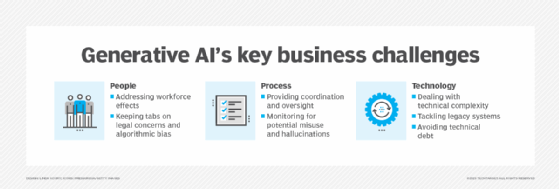
Getty Images/iStockphoto
OpenText broadens content AI services in quarterly release
OpenText adds generative AI tools for enterprise information management, security, business process mining and more in its 24.3 Cloud Editions update.
OpenText's implementation of generative AI for enterprise content management rolls on with its latest quarterly release, Cloud Editions 24.3, as the company added deeper support for different media types into its AI framework.
The company's generative AI tools in the content realm -- called AI Aviators -- have now rolled out to users of all three of its enterprise content management platforms: Core, Documentum and Extended ECM. At the same time, the company has incorporated tech from its Micro Focus acquisition to capture metadata and run analytics on unstructured text, audio, video and image content.
It is still early days for OpenText customers to implement generative AI tools, acknowledged John Radko, OpenText senior vice president of engineering.
Many users still are in evaluation or pilot stages. It's not just OpenText seeing cautious uptake of the new technology, Deep Analysis founder Alan Pelz-Sharpe said; it's happening with most tech vendors. Most have a few solid early adopters to point to, but the grand majority of enterprises have not yet fully bought in to generative AI. Some of the barriers to generative AI adoption include in-house data issues, workflow issues and building a business case to fund it that passes the CFO's muster.
"People in 2024 are still trying out generative AI, fiddling around and testing -- the basics," Pelz-Sharpe said. "And realistically, they will be in 2025 too."
One place where Radko and Pelz-Sharpe predict generative AI will take hold is in the legal vertical, specifically in the realm of discovery, where humans now pore through electronic and paper documents to look for evidence and develop their case strategies. AI will likely do the job much faster and much more accurately, in time, and be able to summarize answers that paralegals and attorneys ask of their case data. OpenText has an e-discovery tool for electronic material in court cases, acquired in 2019.
"The legal industry, legal tech in general, has been a pioneer in the earlier forms of AI as well," Radko said. "[They] have been using machine learning for a long time."
Radko said he sees OpenText customers in all verticals at first using generative AI for better search and summary than current tools can provide, as the technology gets better and better at recognizing and cataloging unstructured data -- and the IDOL framework, acquired from Micro Focus last year, will help on-ramp content. Future uses such as business activity monitoring -- coupled with analytics -- could predict customer actions better and earlier than current tools, and help users improve customer retention.

Also released in Cloud Editions 24.3 is DevOps Aviator, which assists developers in testing apps as they are built and generates reports. In addition, Fortify Aviator assists developers and data scientists in the DevSecOps realm to help fix apps as they test to protect against AI hacks such as prompt injection attacks, model compromise and vulnerabilities in large language models.
In unrelated OpenText news, the acquisition-aggressive company has found itself flush with cash after divesting itself of the application modernization and connectivity software it acquired from Micro Focus. OpenText closed the sale to Rocket Software for $2.275 billion, recouping just a little less than a third of the original $6 billion cost of the Micro Focus acquisition, completed in January 2023, which included hundreds of different enterprise IT tools.
Don Fluckinger is a senior news writer for TechTarget Editorial. He covers customer experience, digital experience management and end-user computing. Got a tip? Email him.






